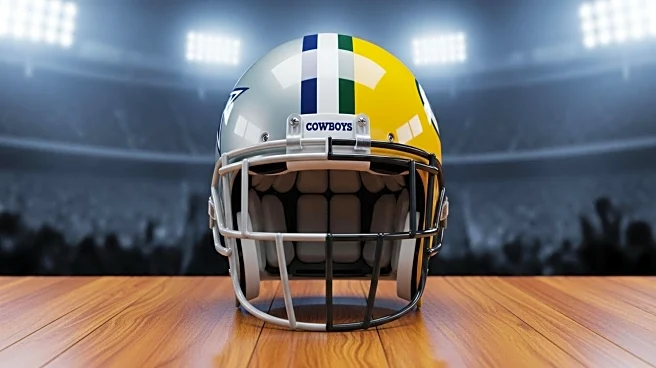What's Happening?
Micah Parsons, a star player for the Dallas Cowboys, has been traded to the Green Bay Packers. This move comes after a prolonged standoff between Parsons and the Cowboys regarding a long-term contract extension. The trade involved the Cowboys receiving defensive tackle Kenny Clark and first-round picks for 2026 and 2027. The Packers have quickly secured Parsons with a new contract reportedly worth up to $188 million. The trade has shocked many, as Parsons is a four-time Pro Bowler and two-time All-Pro, and was a key player for the Cowboys. His jerseys are now being sold at a significant discount in Dallas, highlighting the impact of his departure.
Why It's Important?
The trade of Micah Parsons is significant for several reasons. For the Cowboys, losing a player of Parsons' caliber could impact their defensive capabilities and overall team performance. The trade also reflects the ongoing challenges within the Cowboys organization, which has struggled to reach the NFC title game since 1995. For the Packers, acquiring Parsons strengthens their defense and could improve their chances in the upcoming season. The move has also stirred emotions among Cowboys fans, who are frustrated with the team's management decisions. This trade could influence future negotiations and trades within the NFL, as teams reassess their strategies and player valuations.
What's Next?
The Packers are set to face the Cowboys at AT&T Stadium on September 28, which will be a significant event for both teams and their fans. Cowboys fans will have to adjust to the absence of Parsons, while the Packers will integrate him into their lineup. The trade may lead to further discussions and decisions within the Cowboys organization regarding their management and player retention strategies. Additionally, the NFL community will be watching closely to see how Parsons performs with the Packers and whether this trade will impact the dynamics of the league.
Beyond the Headlines
The trade of Micah Parsons raises questions about the ethical and cultural aspects of player trades in professional sports. It highlights the tension between player loyalty and business decisions within the NFL. The move also underscores the financial implications of player contracts and the pressure on teams to balance talent acquisition with budget constraints. This trade could lead to broader discussions about the treatment of players and the role of fan engagement in team decisions.









